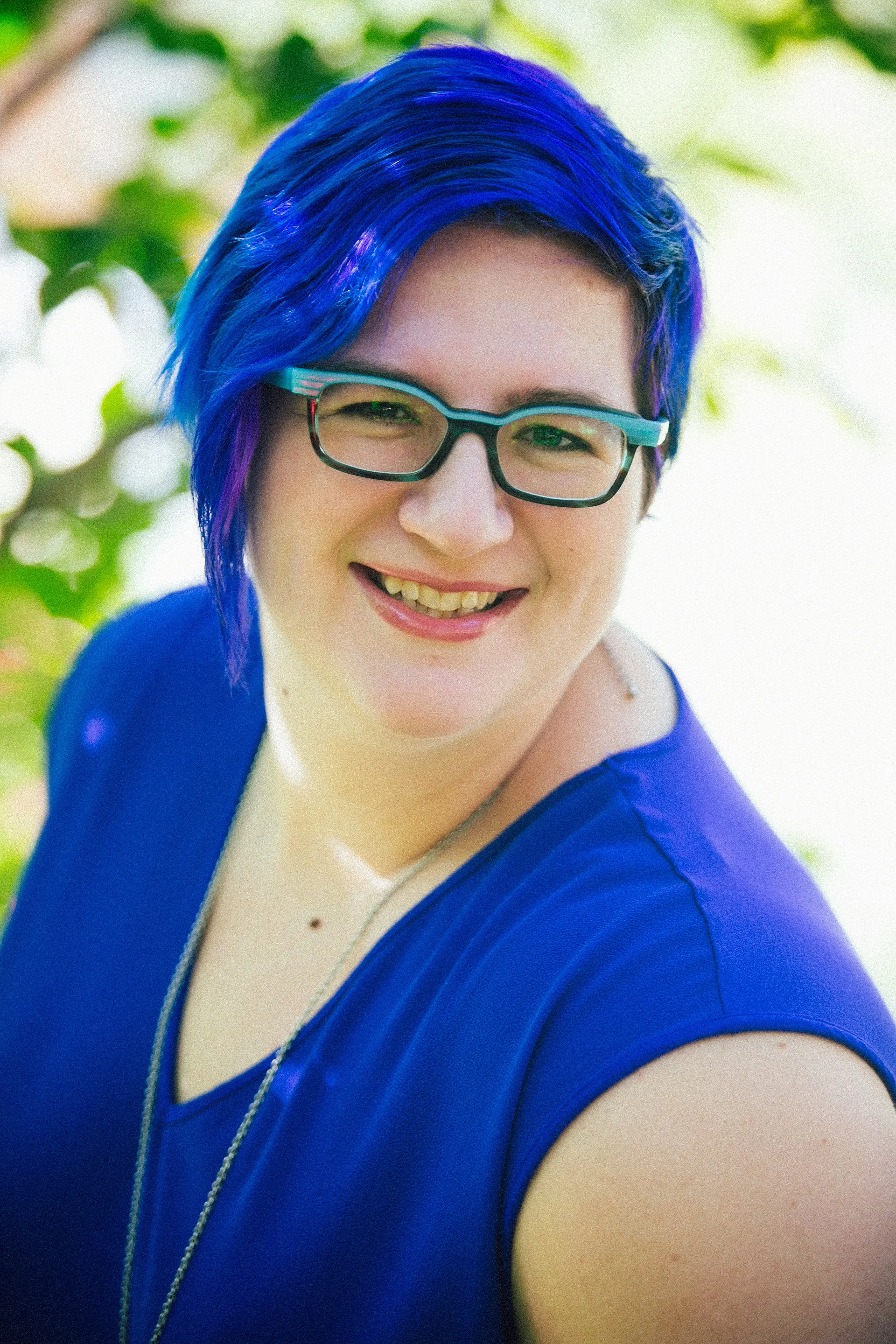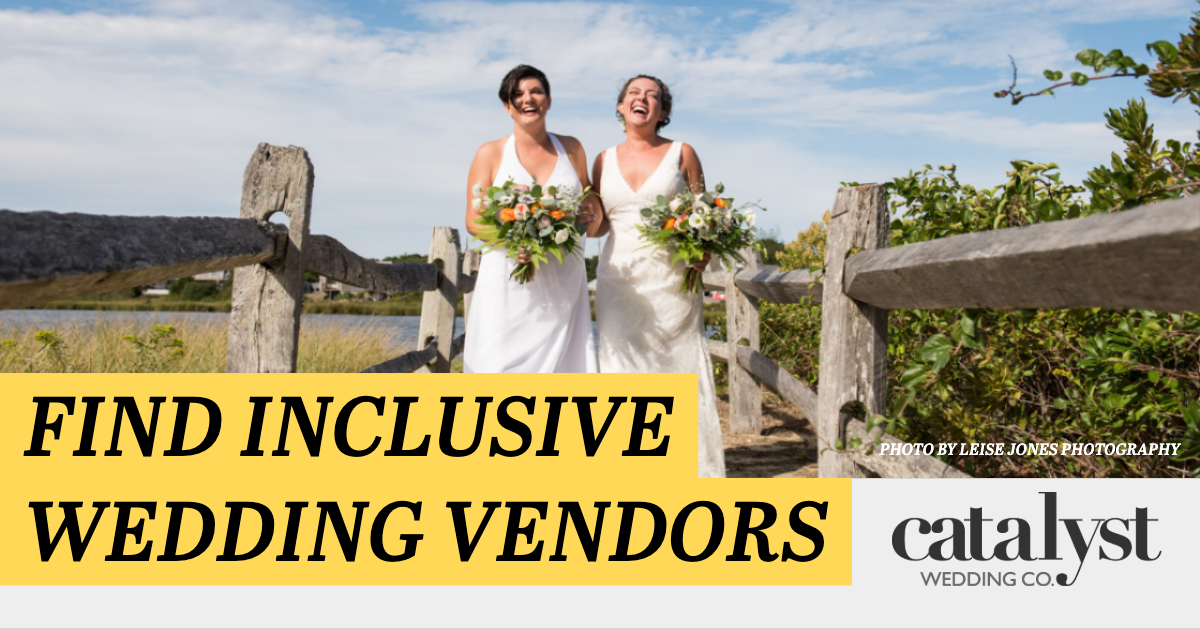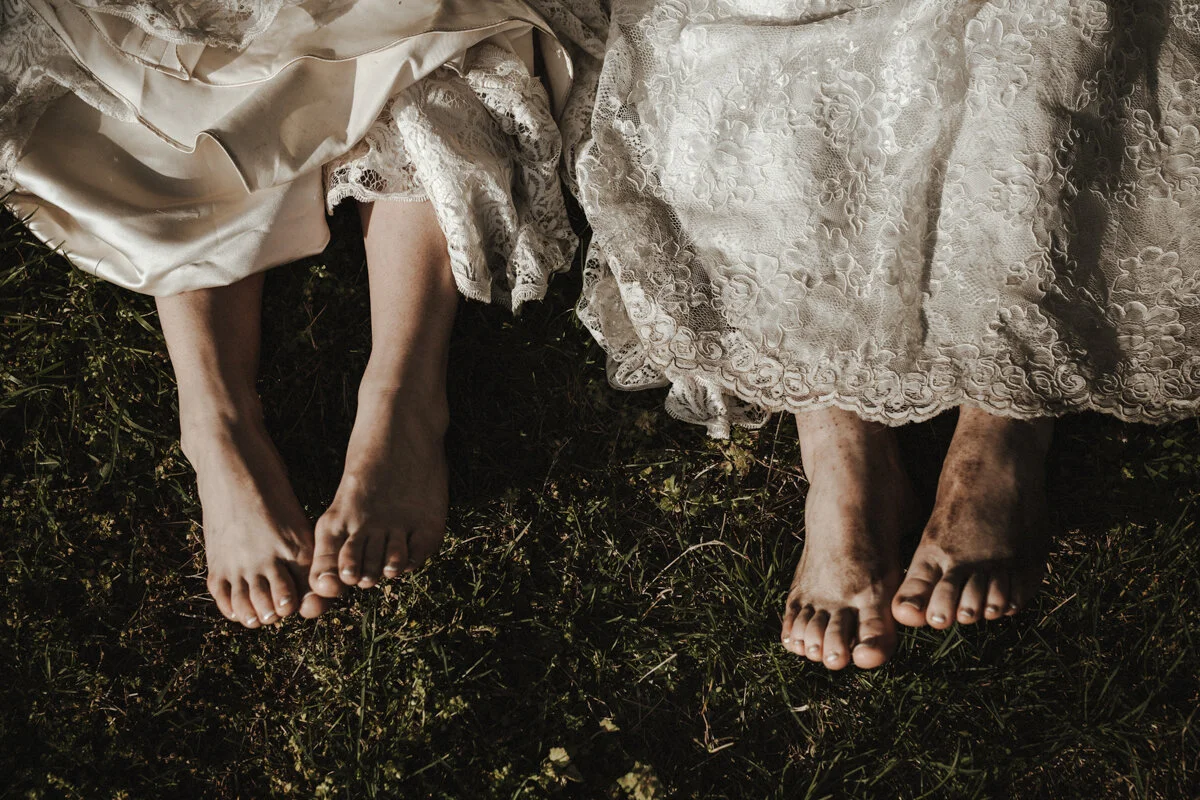Woke Wednesday // Meet Cindy Savage of Aisle Less Traveled
/Photo by Pinxit
We sat down with Cindy Savage, the lead planner of the St. Louis-based company, Aisle Less Traveled. Cindy is challenging the traditional wedding planning model and focusing more on online community, resources, and support.
Liz: Can you tell us a bit about your background? What was growing up like for you?
Cindy: Sure. I grew up here in the suburbs of St. Louis. I've got three siblings (two older, one younger), and I feel like we had a really good, pretty carefree childhood. My mom did a combination of staying at home with us and teaching art at our grade school, so we got a lot of hands-on parenting, but it wasn't like all the helicopter stuff that happens now. We were left to our own devices a lot.
Liz: And what was your transition into adulthood like?
Cindy: Oh man. Well to be totally honest, I was never, ever a kid that fit in well. I always struggled to make friends, and I just frankly never understood girls and girliness really at all. There was a year or two in middle school where I desperately wanted to be a boy, not because I felt like one on the inside, but because the girls weren't DOING anything. They would stand around and talk and gossip and be clique-y. Meanwhile, the boys were actually playing at recess, etc. I felt extremely left out, and I was bullied for being a nerd and being overweight basically from about third grade on.
I'm reasonably certain I had my first real bout of depression in the sixth grade, though I wasn't diagnosed as such until my sophomore year of college. In high school, though, I found theatre, and in it were MY PEOPLE. So I really grabbed onto it, got into a crowd of people that talked about things of substance, and we made (mediocre, high school) art together. And we talked about the big life stuff, and somewhere in there I became a feminist, even though I probably wasn't familiar with the word at the time, and I realized that the Catholic church I'd been raised in was really not for me at all.
I skipped off to college in pursuit of a theatre degree and a Big City (Chicago) and pretty quickly fell hard for...my roommate. Which is super cliche, but there it is. Anyway, she was completely in the closet, and therefore so was our relationship. I struggled hard with that because I really didn't want to be secretive about it! I was head-over-heels in love and wanted to tell the world, and I couldn't, and that sucked.
I ended up isolating myself from the people around me for the two years we were together, and it ultimately was a big part of why that relationship didn't last. Once it was over, I knew I never wanted to live a big lie like that ever again.
Photo by Justine Bursoni Photography
Liz: Would you tell us a bit about what the coming out process was like for you?
Cindy: Yeah. It was horrible from one side and totally great from the other. So: good stuff first. During that first relationship, my best friend had come to visit and totally called me out on what was going on. So she was the first person who knew. And honestly, she knew before that, I'm sure, as I know we'd had some theoretical conversations about it, in which I'd said I could easily imagine being with a woman. I wasn't really worried about acceptance among her, or really any of my friends; it was more that I'd been keeping this secret at the behest of my ex, and now a year and a half in, it felt shitty to have waited so long to tell anyone. I told her, and two or three other people in our tiny theatre department also knew, since I'd needed an occasional confidant. But I started making a concerted effort (mostly via AIM, laughs) to tell my other friends, and every single one of them was instantly supportive. Which was awesome.
Liz: That's great.
Cindy: My parents, on the other hand, are pretty conservative. As I said, I was raised Catholic, and I knew from comments they'd made over the years that there was no way this was going to be an okay thing. I'm a planner (yep!), so the first thing I did was consider timing. I waited about a year after I really was ready to come out to them, because I didn't want to be depending on them for any sort of financial support to live my life, just in case they decided to cut me off or disown me. I didn't really think that was likely, but I like to over-prepare.
They were coming up for a visit to Chicago, and I planned out a whole weekend with the intent that I would tell them, face to face, during the trip. It happened to be the weekend of the annual Bughouse Square debates, which is a thing where there are literal soapboxes and people can stand on them and talk about whatever, and then at the end of the day there is a scheduled debate on a particular topic. It was 2004 and the topic was same-sex marriage (this was right after Massachusetts had enacted it.)
So we went, and went to dinner afterwards, and my parents started asking what I thought about it. I was sooooo nervous and basically just trying not to vomit and also to say what I needed to say, and I managed to get out that I didn't see any reason why LGBTQ folks should not be able to get married, nor any reason to deny them (us) any civil rights at all. I honestly don't remember much from that weekend besides that. I totally chickened out on telling them those things would apply to me.
Photo by M Elizabeth Hershey Photography
Liz: Woah.
Cindy: So, instead of a big in-person thing, I wrote them a letter, and I tucked it into the trunk of the car before they left, where I knew they would find it when they got home. And then I...waited.
I woke up the next morning to an email sent around 3am, with a single question, "What should we tell your siblings?"
Liz: Oh wow.
Cindy: At that point, I think I'd told my older sister, but I definitely hadn't told the younger two. I responded that I'd tell them, so they didn't need to say anything. And I later found out from my brother that it didn't matter what I said, since my parents didn't bother waiting for a response, but rather called a family meeting with the two of them, which my brother refers to as the Spanish Inquisition.
Photo by Sean Molin Photography
Liz: Damn.
Cindy: I'm not clear on whether that also took place at 2am or if it was the next day or something, but in any case, it was before I'd replied. Apparently this meeting consisted of my parents interrogating the two of them about their beliefs, talking about Catholic stuff, and who knows what else. As I understand it, my brother definitely stood up for me, and my sister I expect was pretty quiet — she would have been about 13 at the time.
So a few days later, I'm sitting at work, and the office phone rings. A male voice asks for me, and after I confirm it is me, expecting a sales call (I was the office manager of a law firm at the time), he identifies himself as Father so-and-so and tells me my mom gave him my (OFFICE) number and that she'd said I wanted to talk with him about my struggles. Pretty sure my jaw hit the floor. I said something angrily to him and hung the fuck up.
Then my mom called my CELL PHONE, had the audacity to chide me for hanging up on him, and tried to get me to go to an ex-gay conference that was happening out in the suburbs the following weekend. And I'm pretty proud of myself for shutting that one down immediately as well.
Liz: Yeah, good for you!
Cindy: The next 3-4 years were extremely painful. I didn't see them often. I barely visited despite being only a few hours' drive away, and I never called them or answered the phone when they called me.
Photo by Wasabi Photography
Liz: I'm so sorry to hear that.
Cindy: The few times we were together in that period followed a clear formula: hang out and talk about absolutely nothing of importance for the entire time, but then as we would say our goodbyes, they'd pipe up with "well, we didn't have time to talk this weekend, but we wanted to give you this" and hand me some sort of anti-gay propaganda from the Catholic church.
So, though I didn't come out and say it, I think I made it pretty clear that I would not accept their conversion bullshit. I would refute the materials they would send me with long diatribes filled with actual science facts and guidance from the APA and that sort of thing, and eventually they stopped foisting these things onto me.
Liz: That sounds exhausting.
Cindy: Yes. It really was. Also some of that propaganda is downright hysterical, if you are able to not take it seriously.
Liz: I'm glad you found the humor in it!
Cindy: It was really hard to feel so unaccepted, but I did my best to remind myself that the problem wasn't me, and that did help a lot. And of course, having acceptance and support from my friends and living in a big liberal city helped immensely.
Photo by Cristina G Photography
Liz: Were you working in theatre at this time?
Cindy: Yes. And theatre is the gayest thing ever, so it was no big deal there. I feel lucky that I didn't really have to worry about coming out in any other areas of my life.
Liz: So how did you transition from theatre to event planning?
Cindy: You know, it was one of those things that I'd kind of always thought I'd be good at. My older sister is also a stage manager, and there was a chunk of time when we shared an apartment while doing theatre and I thought: we'd be a good events team. I had a name for it, too! We'd call ourselves S₂ for 2 Savages.
Liz: Love it.
Cindy: Anyway. I had that in the back of my mind. And then in 2007, my younger sister got engaged, I got engaged, and my older sister got engaged, all in the span of three or four months.
Liz: Wow. So can you talk a bit about how Crafty Broads/Aisle Less Traveled came into existence?
Cindy: Yes. So basically, I'd helped my older sister with some stuff for her wedding, which confirmed my interest and skills, and then when 2010 rolled around, we decided we'd had enough of waiting for legality and just got on with planning. I did the vast majority of the planning and had a great time doing it! At our wedding, I was chatting with our photographer, and I don't remember the exact conversation, but somehow he made a comment that having a stage manger in charge was way better than having a wedding planner.
Photo by Timothy Whaley and Associates
Liz: Oh, awesome.
Cindy: And then a few weeks later, we had a dinner party, and we were recounting the various DIY projects we'd taken on (made our own dresses, 3-tier cake, invitations, website, probably some other stuff I'm forgetting), and a friend literally said to us "You two are such crafty bitches. Why aren't you doing this for money?"
Craftybitches.com was taken by some gals in the UK, and we determined that we wanted something slightly less crass, so we landed on Crafty Broads. That's how that happened.
Liz: So that was 2011; what does your business look like today, in 2017?
Cindy: In many ways the same — I've always, as a planner, been highly invested in helping people get the wedding they want with the budget they have regardless of how that compares to what anyone else is doing or telling them they are supposed to do. That's the same.
There's two big differences from Crafty Broads to Aisle Less Traveled. One, pretty obvious, is that I'm now divorced and not working as a business team with my spouse. She was always on the alterations and clothing side of things, so it's not a huge effect in terms of the work I'm doing, but it changes the character of the business somewhat.
And second, which is the bigger shift, is that I'm very intentionally moving away from the traditional wedding planning business model.
Photo by Eivans Photography
Liz: Could you say more about that?
Cindy: I continue to offer things like wedding coordination and full-service planning, and I expect I always will, but where I'm really heading is toward being an internet-based planner offering my knowledge and service in a group setting so that I can help more people who really need it.
Liz: That's super cool.
Cindy: When you have a big budget, it's pretty easy to find what you need, hire the best people, and count on them to work together to make a seamless wedding day happen. But for the rest of us (I say us, because I had a $5k wedding in Chicago for 75 guests, so I promise I've been there!) — our budgets are laughably small to a lot of vendors. And the folks who tend to have smaller budgets tend also to be marginalized in the culture as a whole. And smaller budgets mean a lot more DIY, figuring it out as you go, and a huge need for assistance with sorting out the logistics. I am damn good at the logistics, and it's my hope that by offering my services in an innovative way, I can reach those people who otherwise would not be able to afford any planning help. Because EVERYONE who manages to find someone to love for the indefinite future deserves a smooth and wonderful day of celebration!
Liz: So today is Woke Wednesday. Do you consider yourself woke, feminist, or otherwise a social justice advocate?
Cindy: Yes. Fuck yeah, I am a feminist. I will scream that from the rooftops all day long, every day, forever. I consider myself to be a strong advocate on women's and LGBTQ issues and to be waking up as much as I can as fast as I can on the issues that I haven't personally experienced or just don't know enough about.
Liz: I love that. So how do you incorporate feminist values into your wedding planning biz?
Cindy: Well. First of all, I start with the assumption that both parties getting married are going to be equally involved in the planning. That means I never address things to the bride only, that I request both partners attend consultations and planning meetings, and that all my emails go to both people. When I see things come through from other vendors addressed only to the bride, or with heteronormative language on them, I request changes before I pass on to my clients. I ask "will either of you be changing your name?" Those are all little things, but they matter.
I also love to learn and research stuff, so when couples don't have a clear answer for whether they want to do a certain tradition, like wear a veil or smash cake in each other's faces or walk down the aisle with their father, I will often provide them with the history and a suggestion that is egalitarian.
On the behind-the-scenes side, as in my everyday life, I correct men who believe I cannot lift heavy things because I am a girl or who think I don't know things about lighting or sound because I am a girl.
Photo by Justine Bursoni Photography
Liz: Awesome. How has this approach been received?
Cindy: Fantastic! The other day, I posted a headline I'd seen that was "5 Things Brides Regret Spending Money On" or something like that, with a comment calling out the sexism in the headline and how bride-centrism is problematic in the industry, and a former client jumped into comment that one of the reasons they'd hired me is BECAUSE I included her husband from the get-go and assumed he'd be equally involved. So, it's well-received, I think.
I've got a free Facebook group for engaged couples, and there was discussion there too — mainly, that women are frustrated when their (male) partners don't want to participate, or aren't as invested. They are wishing the culture and the industry would compel more participation from their future spouses, because they understandably don't want to do all the work! (And it's a lot of work!)
Liz: Yes, absolutely. So looking back at your college-aged self from your current vantage point, are there any words of encouragement you can offer your former self?
Cindy: Oh god, so many!
1. Don't be afraid to be yourself. You are totally lovable and worthy of love, and anyone who doesn't give to you isn't worthy of you.
2. Don't let anyone else squish your big dreams. Just keep working towards them. Don't let the bigness get in the way of doing the small steps that are the work.
3. Learn marketing!
4. (but should be #2 in terms of priority or is maybe part of #1) Be honest. Tell the truth, even when it is harsh. Do it as gently as you can, but don't avoid it.
5. Get a good therapist. Keep her forever.
Liz: Thank you so much, Cindy, for offering such a vulnerable and candid perspective on where you've been and where you are going. Are there any final words you'd like to leave us with?
Cindy: #RESIST
To the readers: Have the wedding you want to have. Don't worry about what anyone else is doing or what they think about your choices. And never be ashamed to love who you love.
Liz: I love it. Thank you, Cindy!





























